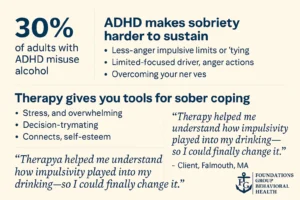You’re the sober one at brunch. The one who says “I’m good” when someone hands you a drink. The one still figuring out how to be fun, social, or just okay without something in your system taking the edge off.
And if you’re honest? It feels weird. Like being the only one wearing headphones in a room full of music. You’re tuned into a different station now—and you’re not sure if you belong anywhere.
This is common in early sobriety. Especially if you’re young. Especially if you’re trying to keep it together while the world keeps spinning like you never changed. You did, though. And therapy can help that shift feel less isolating.
At Foundations Group Behavioral Health, we work with young adults on Cape Cod who are navigating the tension between healing and hiding. Here’s how mental health therapy can make you feel a little more human—and a lot less like the “weird one.”
1. Therapy Lets You Say the Stuff You Can’t Say Anywhere Else
In real life, people expect clean narratives.
“I’m sober now.”
“Things are better.”
“I’m fine.”
But you might also feel:
- Angry that your friends still get to drink
- Jealous of people who can “just have one”
- Lonely in crowds, especially the ones you used to love
- Confused about who you are without substances
Therapy is the place where you can say all of that. Unfiltered. Without a follow-up “but it’s all good!” tacked on for comfort. And no one in the room tries to fix you for it. They just listen—and help you explore what it means, not judge that you said it.
2. You Learn the Difference Between Being Alone and Being Isolated
In therapy, you talk through what it actually means to feel disconnected. You untangle the difference between:
- Not vibing with your old friends anymore
- Avoiding people because you feel different
- Withdrawing because it’s safer than explaining
- Craving new connection but not knowing where to start
Feeling “weird” is often code for “I don’t know where I fit now.” Therapy helps you name that—and start figuring it out in real time.
3. Therapy Gives You Tools to Handle Social Spaces Without Melting Down
Whether it’s your cousin’s wedding or a backyard BBQ, therapy gives you strategies for:
- Navigating triggering environments
- Setting subtle boundaries without making it a whole “thing”
- Dealing with people who question your sobriety
- Managing the shame spiral when you feel awkward, quiet, or out of place
You’re not just learning how to cope—you’re building scripts and skills that help you show up in a way that feels authentic, not performative.
4. You Discover You’re Not the Only One Rebuilding an Identity
Early sobriety often feels like emotional puberty.
You’re growing into a version of yourself that’s still forming. Your values are shifting. Your interests are different. You’re different—but you don’t always know how to explain it, even to yourself.
In therapy, you get to ask:
- Who am I now?
- What parts of me are real vs. reactive?
- What do I want from friendships, dating, purpose, life?
These aren’t abstract questions. They’re real-time recalibrations. And they’re easier to answer when you’re not asking them alone.
5. Therapy Helps You Like the Parts of Yourself That Felt Like a Problem
Maybe you’ve always been the “too much” one.
Too emotional. Too intense. Too sensitive. Too all-or-nothing.
Guess what? Therapy doesn’t try to tone that down. It helps you understand why those parts developed—and how they can become assets instead of liabilities.
That sensitivity might mean you’re deeply intuitive.
That all-or-nothing streak might mean you care deeply and act with conviction.
That emotional intensity? Could be the root of your creativity and insight.
Therapy doesn’t erase your weird. It reframes it.
6. You Start to See Progress That Has Nothing to Do with Milestones
In recovery spaces, there’s a lot of focus on days sober. Chips. Months. Anniversaries.
But therapy helps you track quieter wins:
- Feeling less panicky on Monday mornings
- Going a whole week without spiraling after a social event
- Saying “no” without explaining yourself
- Laughing. Like really, actually laughing again
These aren’t always celebrated out loud—but they are signs you’re healing. And your therapist will notice. Even when you don’t.
7. You Realize You’re Not the Weird One—You’re Just Early
This might be the most important shift of all.
You’re not broken. You’re not behind. You’re just ahead of the curve in your circle—awake to things other people are still numbing out.
That feels lonely sometimes. But in therapy, you start to see it as something else: brave.
You chose to stay. To feel. To heal. And that might make you different—but it doesn’t make you wrong.
What Therapy Feels Like (According to Real Clients)
“Therapy was the only place I didn’t feel like I had to smile and say I was fine. That was new. And needed.”
— Outpatient Client, Cape Cod
“I used to think I was bad at relationships. My therapist helped me realize I’d just never seen one modeled without chaos.”
— Client, Falmouth, MA
“I thought therapy was going to be boring. It ended up being the one place I actually started liking who I was becoming.”
— Young Adult, Barnstable County
FAQ: Therapy for Young People in Early Sobriety
Is therapy different from recovery groups?
Yes. Recovery groups are peer-based and often follow a specific model (like 12-step). Therapy is more personalized, led by a licensed clinician, and focused on your unique emotional and psychological growth—not just substance use.
Do I have to talk about my addiction in every session?
Not at all. You can talk about anything—relationships, self-worth, anxiety, identity. Your sobriety is part of your story, not the whole thing.
Can I do therapy even if I’m already in IOP or another program?
Absolutely. Many of our clients combine individual therapy with other support services. We coordinate care when needed—or offer therapy as a stand-alone option for those stepping down.
Is it normal to feel awkward or fake at first?
Totally. Most people feel weird in early sessions. That doesn’t mean therapy isn’t working. It just means you’re adjusting to being honest in a new way. Over time, that awkwardness becomes comfort.
What if I want a therapist who understands LGBTQ+ stuff, ADHD, or trauma?
You should ask for that. At Foundations, we match clients with therapists who can support their full identity—not just their diagnosis.
Do I have to commit to long-term therapy?
Nope. You can try a few sessions and decide. Some clients stay for a while, others check in every so often. There’s no right way to do this—only your way.
Looking for Mental Health Therapy in Barnstable County?
Whether you’re newly sober, six months deep, or just finally ready to deal with the emotional side of things—you don’t have to figure it all out alone.
At Foundations Group Behavioral Health, our therapy services in Barnstable County and Falmouth, MA are built for young adults navigating real life, emotional chaos, and identity work in early sobriety.
Call 888-685-9730 to learn more about our mental health therapy services in Cape Cod, MA. You don’t need all the answers to take the first step toward feeling better.









